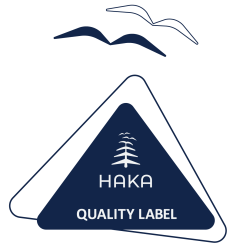Institutional accreditation
Every seven years, all Estonian higher education institutions must undergo external evaluation – institutional accreditation. The assessment visit took place from 11 to 14 April 2022. In July the assessment council of the Estonian Quality Agency for Education (HAKA) has decided to accredit the University of Tartu for the next seven years.
Institutional accreditation is an external evaluation in the course of which Estonian Quality Agency for Higher and Vocational Education shall assess compliance of the management, administration, teaching and research activities, as well as the environments of education and research at a higher education institution (HEI), with legislation and with the objectives and development plan of that HEI. The purpose of institutional accreditation is to support the development of strategic management and quality culture that values learning-centeredness, creativity and innovation in the HEIs, as well as to increase the societal impact of education, research and development delivered by the HEIs.

HAKA shall assess the HEI according to twelve standards. Assessment focuses on the core processes of the HEI – learning and teaching, research, development and creative activities, and service to society – as well as on strategic management of the organisation, resource management, academic ethics, quality culture and internationalisation. The learning and teaching process is examined under five standards: study programme, teaching staff, learning and teaching, student assessment and learning support processes (see also the institutional accreditation guidelines).
To assess the application of principles and regulations established at the institutional level in the learning and teaching process, as well as the performance of an internal evaluation system for study programmes offered at the higher education institution, EKKA shall also assess study programmes on a sampling basis during the accreditation review. The University of Tartu and EKKA have chosen six curricula the internal evaluation results of which will be added to the university's self-assessment report for institutional accreditation.
- Entrepreneurship and Digital Solutions (professional higher education, Narva College),
- Law (bachelor's studies),
- Biology and Biodiversity Conservation (bachelor's studies),
- Translation and Interpreting Studies (master's studies),
- International Relations and Regional Studies (English-taught master's studies),
- Robotics and Computer Engineering (English-taught master's studies).
- Jürgen Kohler – chair of the committee; Professor, Greifswald University (Germany)
- Fiona Ruth Crozier – secretary of the committee; independent consultant (United Kingdom)
- Engel-Mari Mölder – student, Tallinn University of Technology (Estonia)
- Liz Bacon – Professor, Abertay University (United Kingdom)
- Laurent Counillon – Professor, Université Nice Sophia Antipolis (France)
- Markus Dettenhofer – reseacher, Czech University of Life Sciences Prague (Czechia)
- Anca Greere – Professor, Babeș-Bolyai University (Romania)
- Aalt Willem Heringa – Professor, Maastricht University (Netherlands)
- Jonas Hinnfors – Professor, University of Gothenburg (Sweden)
- Sokratis K. Katsikas – Director, Norwegian Center for Cybersecurity in Critical Sectors (NORCICS) (Norway)
- Andres Kütt – member from outside of HEIs; CTO, Jio Egov Center of Excellence (Estonia)
- Oliver Vettori – Dean, WU Vienna (Austria)
Short videos introducing the university
Watch the videos to get an overview of the academic buildings and learning environment of the University of Tartu, as well as the activities of its faculties


